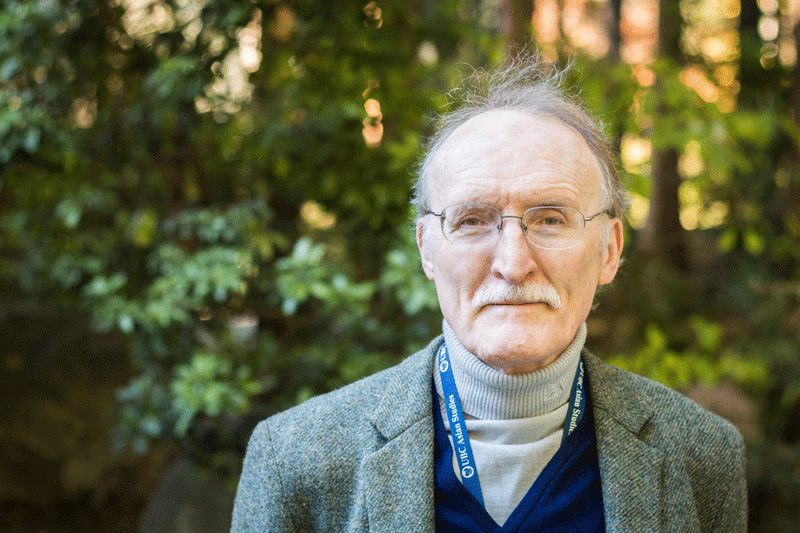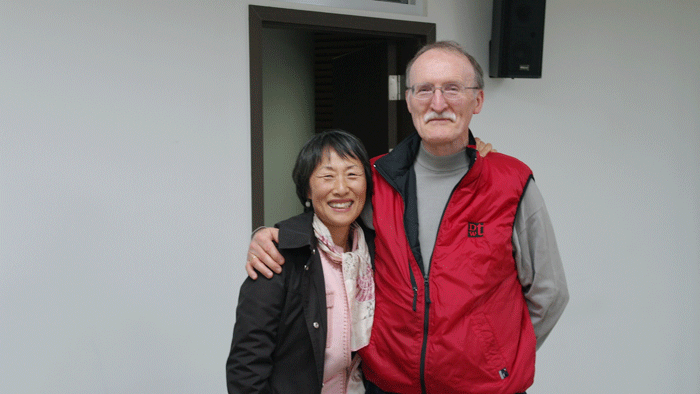 Professor Bruce Fulton promotes Korean literature to the world: “Literature and novels are key to understanding Korea’s advanced technology and the cultural trend of Hallyu”
Professor Bruce Fulton promotes Korean literature to the world: “Literature and novels are key to understanding Korea’s advanced technology and the cultural trend of Hallyu”
Photo Courtesy of Oliver Mann, Department of Asian Studies, University of British Columbia
While literary reading is generally on the decline these days, this seems particularly so when it comes to Koreans’ consumption of Korean literature. But even at a time like this, there’s one man who reads Korean novels, poetry, plays, and even webtoons. His name is Bruce Fulton, and he is a professor at the University of British Columbia who has been translating Korean literature for four decades. We asked Professor Fulton—who says he prefers novels as a translator, and poetry or songs as a professor of literature—what Korean literature means to him.
Thank you very much for agreeing to this interview for the KF Newsletter. We understand you visited Korea in the fall of last year when the KF invited former Peace Corps volunteers from September 29 to October 6. Unlike other participants, you are quite familiar with the development of Korea, and your impressions of the visit must have been different from theirs. Would you tell us about that?
It’s my pleasure. The 2018 U.S. Peace Corps Volunteers Revisit Korea Program, sponsored by the Korea Foundation and Friends of Korea, was a meaningful experience for Ju-Chan Fulton, my good wife and translation partner since 1979, and myself. It is perhaps true that I am more familiar than most of my Peace Corps colleagues with Korea’s development over the past 40 years, and yet I believe that during the Revisit Program the other Peace Corps volunteers and I shared similar impressions of feeling grateful for the warm welcome we received from our hosts in Seoul as well as renewed appreciation for the beautiful Korean countryside, the pleasures of Korean food, and the richness of the Korean oral tradition, all of which were on display during our visit to the Korean Folk Village (Minsokchon). If there was a difference in impression it may be precisely because of my familiarity with Korea over the decades: for me the Revisit Program felt more like a homecoming, whereas I sensed that for some of my Peace Corps colleagues the Revisit Program was more like a tourist experience.
We heard that you went to Jangsu County in North Jeolla Province, where you used to teach English as a Peace Corps volunteer. What was it like to be there again after nearly forty years? The county must have changed a lot. Was there anything that remained the same as before?
Yes, during the Revisit Program Ju-Chan and I visited Janggye Middle School, where I taught in 1978. It was wonderful to reunite with my co-teacher from that time, Mr. Moon Intaek; to meet the new principal and vice-principal of the school and witness their dedication to their students; to spend part of a class hour interacting with the students; and to make a surprise visit to the mother of the family with whom I lived in 1978. The county has indeed changed. For example, in 1978 Janggye was a ri (village); it is now a myŏn (township). And the number of students enrolled in Janggye Middle School is less than half the enrollment in 1978. And yet the warmth of the people and the calmness and quiet of the countryside remain.
You began to translate Korean literature into English in 1983. Do you think Korean literature has any special appeal or strong points? If so, what are they?
Ju-Chan and I actually began translating Korean literature in 1980; 1983 marked the publication of our first book-length translation. For me the special appeal of Korean literature has always been storytelling, which is perhaps why I was drawn initially to the short fiction of Hwang Sunwŏn and why Ju-Chan and I continue to translate his works. The more I read, study, and translate Korean literature the more I appreciate Korean oral literature and those works of modern literature that manage to capture, through language, characterization, and mood, the performance tradition that is essential to oral literature. And ironically, while Ju-Chan and I in our translations focus on modern fiction, in my teaching at the University of British Columbia I find myself increasingly drawn to shiga (“poetry and song”), and especially the vernacular lyrics of Shilla, Goryeo, and Joseon times.
You have translated over 150 Korean literary works into English and published them directly or indirectly. What do you think is the best of all those works? If it is too difficult to single out one, please select three or four.
Among the most successful—or perhaps “most memorable” would more accurately reflect our feelings about these translations—are the following:
(1) Words of Farewell: Stories by Korean Women Writers (stories by O Chŏnghŭi, Kang Sŏkkyŏng, and Kim Chiwŏn): We chose these three writers in response to the recommendation of Hwang Sunwŏn. The collection is meaningful to us in that it was our first translated book to be published in the U.S. (1989), and we consider it successful in that it drew comparatively widespread attention to modern Korean fiction and especially to writing by Korean women–the book sold almost 10,000 copies, which is likely a record for book-length translations of Korean literature published by small presses and academic publishers.:
(2) The Dwarf, by Cho Sehŭi (2006; a linked-story novel, the title of which could be translated literally as “A Small Ball Launched by a Dwarf”): We chose to translate this work because I consider it the most important one-volume novel in modern Korean literature, not only for its subject matter (social and economic problems arising during President Park Chung Hee’s industrialization program) but also its deceptively simple style, by means of which the author hoped to reach readers of all ages.:
(3) “There a Petal Silently Falls” (a novella by Ch’oe Yun): We chose this story because of the importance of the theme of trauma resulting from the Kwangju Uprising of 1980, and because of its brilliant three-part narrative, which is told alternately from the point of view of a traumatized girl wandering the countryside, a construction worker who abuses her, and a group of university students who are trying to find her. The translation of this novella and two other stories constitute our book There a Petal Silently Falls: Three Stories by Ch’oe Yun (2009), which earned starred reviews in two major American review journals, Booklist and Publishers Weekly.:
(4) “The Bone Thief” (a story by Hwang Chŏngŭn): We chose this story because it is one of the most compelling love stories we have ever read.:
(5) Sunset: A Ch’ae Manshik Reader (2017; a collection of writings in a variety of genres by one of the most distinctive voices in modern Korean literature): We decided on this project because of our long affinity with the works of this writer and because of our desire to institute a series of volumes on iconic Korean writers that would avoid the traditional “representative works” approach and focus instead on the rich variety of their writing.:
(6) Mina (2018; a novel by Kim Sagwa): we chose this novel of a love-hate relationship between two high school girls because we found it to be the most realistic account of the psychological pathology that pervades the Seoul metropolitan area in the new millennium, and because translating this novel was for us an intense, almost hypnotic experience—a reaction also articulated by several reviewers of our translation.
Having translated Korean literary works, especially fiction, for more than 30 years, you must be keenly aware of the changes in Korean literature and its trends. At one point in the past, you observed that Korean fiction seemed to be male-oriented and patriarchal, and that it was lacking in imagination while being rich in the strength of realism. How would you comment on the Korean literature today?
I find Korean literature today more imaginative than it was during the decades of military dictatorship. At the same time, I find it richer in terms of psychological insight. On the other hand, although I see more gender equality in the production of literary fiction, the production of poetry and theatrical drama remains male-dominated, in my view. I am happy to see more genre elements in fiction from the new millennium but at the same time would like to see a greater emphasis on storytelling. I also note with pleasure an increase in border-crossing stories—that is, works of fiction that involve settings, characters, and issues beyond the Korean peninsula. I am encouraged to see the emergence of Kim Hyesun as a major force in poetry: I consider her to be by far the most imaginative poet in Korea today. And I welcome the increasingly experimental approach of Korean dramatists who skillfully blend the performance tradition of Korean oral literature with innovations from Western theater.
Could you share a little about the works you are currently translating or planning to publish?
Ju-Chan and I are happy to announce that one of our current projects, One Left, by Kim Sum—the first Korean novel to focus exclusively on the Korean “comfort women”—has been accepted for publication by the University of Hawai’i Press. We are also in negotiations with prospective publishers about our translations of several novels by women writers. In 2019, Ju-Chan and I plan to compile a Hwang Sunwŏn reader, which in its variety of contents will be patterned after our Ch’ae Manshik reader, mentioned earlier. And in collaboration with my UBC colleague Professor Ross King I will be compiling a volume of modern Korean parody fiction. Finally, Ju-Chan and I are seeking a publisher for a print version of our translation of Yoon Taeho’s graphic novel Ikki (Moss), which was published online in webtoon (scroll-down) format in its entirety at The Huffington Post in 2015-16.
Would you say some words of greeting to our newsletter readers? Literally reading seems to decline more and more these days, both where Korean literature and literature in general are concerned. It would be nice if you would tell them something good about Korean literature.
Surveys suggest that in any given year approximately 60 percent of the books published in Korea are translations. Of the remaining 40 percent—that is, books originally written in Korean—it seems that works of fiction are very much a minority. And so I would agree that the readership for Korean literature seems to be declining and maintains only a modest profile in the English-speaking world. This is unfortunate, in that Korean literature opens a window onto Korea that few if any academic or trade nonfiction books can duplicate. To the readers of the KF Newsletter, I would suggest that modern Korean fiction in general has much to offer readers, whether domestic or overseas, about Korean history, politics, culture, society, and spirituality in the modern period. Modern Korean poetry is rich in spirit and world-view, and modern Korean theater is helping to keep the venerable Korean oral tradition alive at the same time that it challenges viewers to engage with salient issues confronting Korean society today. So if you enjoy reading and wish to learn how Korea has become one of the most high-tech nations in the world as well as the producer of a cultural wave, Hallyu, that is sweeping the globe, grab a hot drink or a cold brew; crack open any of the numerous anthologies of modern Korean short fiction, Korean poetry past or present, and (increasingly) Korean drama in English translation; and enjoy!
Interviewed by Kim Daniel

Professor Fulton and his wife Ju-Chan
 KOREA FOUNDATION
KOREA FOUNDATION newsletter
newsletter










